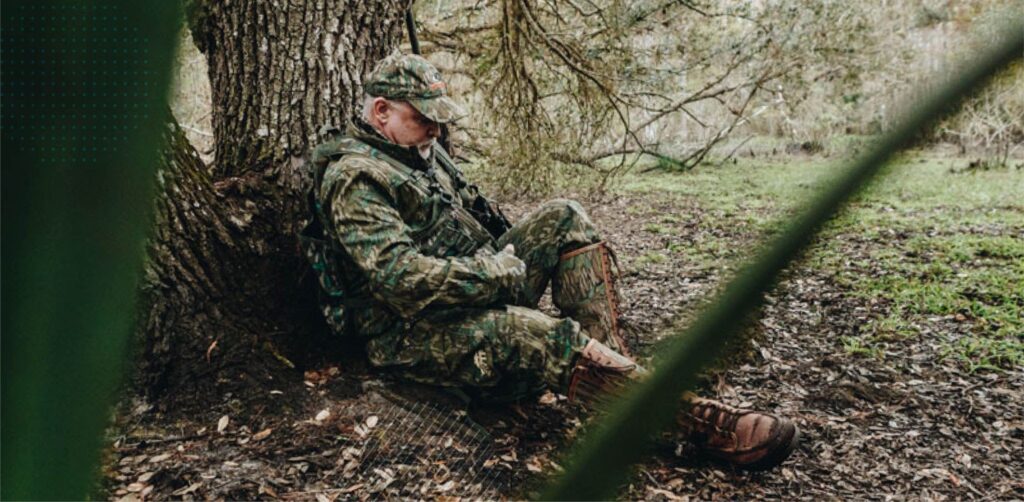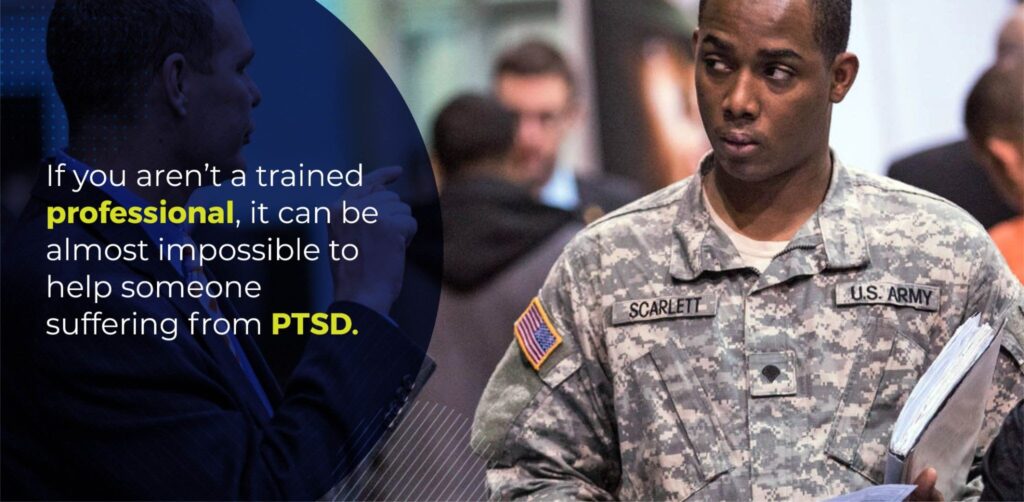Blog > How to Sleep Better With PTSD? [Veterans Special]
Blog > How to Sleep Better With PTSD? [Veterans Special]
Post-traumatic stress disorder (PTSD) is a serious and sometimes life-threatening mental illness caused by witnessing a traumatic event such as a natural disaster, a major accident, a terrorist act, war/combat, those who have been threatened with violence, survivors of abuse, witnessing a loved one go through a traumatic event, etc.
PTSD can take various forms. The following are some of the most prevalent symptoms:
PTSD does not have a single cause and there is no guarantee that a person who experiences a traumatic event will develop it. According to the American Psychiatric Association, 3.5% of adults in the United States are diagnosed with PTSD yearly.
No one is immune to PTSD—one group in particular—veterans, are particularly vulnerable, with hundreds of thousands of veterans suffering yearly. In recent years, as mental health awareness has grown, there have been more honest conversations about PTSD and accessible resources to help.
Veterans are at an increased risk of sleep problems stemming from PTSD. A self-report survey among veterans diagnosed with PTSD found 70% to 90% experienced sleep disturbances. One study found that 44% of veterans with PTSD experienced trouble falling asleep on a regular basis compared to 5% of the general population.
The following guide breaks down the symptoms of PTSD, how it affects sleep, how to cope, and some additional resources for veterans.

Individuals with PTSD often have difficulty falling asleep, waking up, and experience frequent waking throughout the night. Many people who suffer from PTSD experience nightmares. These symptoms cause sleep interruptions and decrease sleep quality.
Additionally, those suffering from chronic pain, substance abuse, traumatic brain injury, depression, or other medical conditions, along with PTSD have an even more difficult time with sleep.
Here are the most common sleep problems experienced by those with PTSD.
Insomnia affects 9 out of 10 people with PTSD. Those with PTSD are more likely to experience hyperarousal, or the inability to relax. Hyperarousal in those with PTSD might be a side effect of being in a scenario where the individual needed to be alert at night. The stress of not being able to sleep can cause sufferers to turn to substance abuse.
The majority of people with PTSD suffer from nightmares and night terrors. This causes them to wake up in the middle of the night and have trouble falling back to sleep. The dreams are often linked to the traumas experienced that led to the PTSD.
According to new research, those with PTSD are more likely to develop sleep apnea, a condition that causes you to stop breathing while you sleep. The study of veterans found 69.2% of participants were at a high risk for sleep apnea. Those with PTSD had an increased risk versus those who didn't.
When you lose sleep at night, it can be tempting to nap during the day. This can lead to only being able to sleep during the day, which can disrupt your sleep patterns and make sleeping at night much more difficult.
The National Center for PTSD and the U.S. Department of Veterans Affairs estimates that anywhere from 11% to 30% of veterans have experienced PTSD. This range is based on the service era with veterans who served in Vietnam ranking the highest at 30%, while 11 to 12% of veterans who served in the Gulf War and Operations Iraqi Freedom (OIF) and Enduring Freedom (OEF) experience PTSD.

If your PTSD symptoms are causing you to have trouble falling asleep or staying asleep at night, there are some things you can do to improve your sleep and ultimately your health. Once you've decided to make a change, stick with it for optimal results.
Here are some suggestions to improve your sleep with PTSD.
Maintaining the same sleep schedule will regulate your circadian rhythm and keep you on a routine. Over time, your body will adjust to the new schedule and you will naturally start getting sleepy at your newly implemented bedtime.
Tip: To help your body get ready for bed, establish a bedtime routine like taking a warm shower or drinking a cup of decaffeinated tea. Avoid stressful situations and activities before bedtime. Wear earplugs and a sleep eye mask if you are bothered by loud noises.

If you're having trouble sleeping, try relaxing first to calm your mind and body. To prepare your body for sleep, try relaxation techniques like meditation or yoga. If you want to try something more advanced like Progressive Muscle Relaxation, where you tense and relax certain muscle groups until you fall asleep.
Tip: Avoid watching TV, scrolling through your phone, or using the computer before bed. The blue light from screens disrupts circadian rhythms and makes it more difficult to sleep.
If you're having trouble sleeping, it might be time to update your bedroom. To improve your sleep, make sure your bedroom or sleeping environment promotes good sleep. Experts advise only to use your bed for sleep and sex. Make sure your room is dark without distractions like outside light or noise.
Tip: Keep the temperature in your room at least 65 degrees––the optimal temperature for the best sleep.
What you do during your waking hours can impact your sleep. Pay attention to how certain activities impact your sleep. Here are some things to look out for.
If you’ve tried various methods to help with your PTSD-related sleep issues and you’re still having trouble, your doctor can help.
Your doctor can prescribe medications to help you sleep, discuss options for talk therapy or other psychological help, refer you to sleep specialists, and give you advice on how to improve your sleep. Treatment options will vary depending on your overall health.

Coping with PTSD can be difficult and often impossible for some. However, there are some coping strategies that can help you.

Living with someone or having a friend with PTSD can present challenges. When your friend or loved one exhibits symptoms like social withdrawal or mood swings, it can be hard not to take them personally.
If you aren’t a trained professional, it can be almost impossible to help someone suffering from PTSD. The afflicted person might lash out for trying to help them-even when you have good intentions in doing so.
If you have a friend, spouse, or significant other suffering from PTSD, here are a few things that can help.
PTSD is a complicated, varied disorder and presents in a variety of ways. By becoming familiar with the symptoms and treatment options, you can help your loved one narrow down treatment options to find the best one for them.
Many people suffering from PTSD often feel like a burden to others. Avoid treating them differently or making them feel like an outsider or outcast for having PTSD. Treating them differently or making a fuss over their symptoms and diagnosis may exacerbate their symptoms rather than creating a loving, supporting environment of normalcy.
Let your loved one with PTSD be in charge of their treatment plan and options. This will give them the power to decide their own treatment. Everyone processes emotions and resolves problems in their own way–what works for one person may not work for another.

It might be difficult for you to listen to your loved one and it might take some time for you to feel comfortable enough to speak to them about their experiences. When that time comes, be patient and empathetic. Don’t force your loved one to discuss something they don’t want to.
Learn coping skills for stress and help your loved one avoid stressful situations. As an important person in the life of the PTSD patient, is it vital to learn stress management skills so you can be a dependable support system.
People with PTSD have emotional struggles and mood swings. Recognize moods can change fast, and attempt to preserve a feeling of normalcy in your surroundings by being calm.
When trying to help someone with PTSD, it’s common to step over boundaries and accidentally end up making things worse even when we have the best of intentions. It can be easy to unintentionally say or do something that triggers a memory.
Here are some things to avoid when you have a loved one with PTSD.
There are many resources available online to help veterans diagnosed with PTSD. You can easily find support groups and other ways to get help. The VA can help connect you with doctors in your area as well as offer support.
Here are a few additional resources that can help.
If you are a veteran suffering from PTSD, remember that you are not alone; it may seem hopeless at times, but there are plenty of resources and treatment options available. Along with the emotional symptoms of PTSD, sleep disturbances are common and can cause even more health problems. Veterans with PTSD and more likely to turn to self-medication through substance abuse, self-destructive behaviors, or mental problems.
If you or a loved one is a veteran suffering from PTSD and have trouble sleeping, make sure to talk to your doctor and seek therapy. In the meantime, read our blog to learn more about how sleep impacts your health, sleep advice, and more.

 Showrooms
Showrooms
Meet The Author:
Shanir Kol
Shanir Kol, founder and CEO of SleePare, pioneered the “Try and Buy” model in eCommerce, enhancing mattress shopping by combining in-store trials with online purchases. Launching in 1999, his company focuses on customer satisfaction and eco-friendly practices, aiming to minimize mattress waste and expand sustainably.